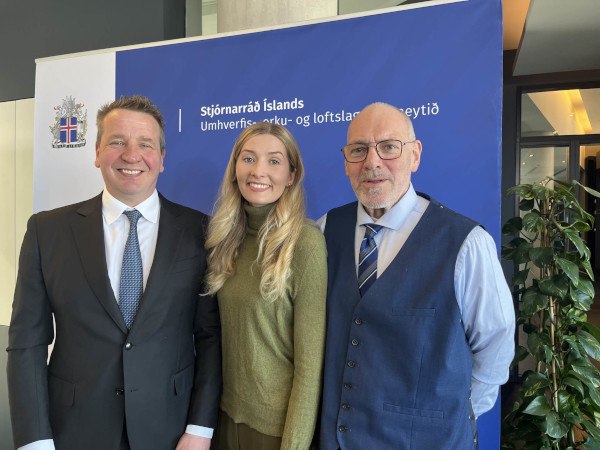A working group, appointed by the Icelandic Minister of the Environment, Energy and Climate, has published a report including 50 proposals for ways to improve energy use and energy procurement in Iceland, thus supplying at least 3,800 GWh of additional energy annually by 2040.
The working group was appointed in April 2023 to investigate the main ways how to improve energy utilization and energy procurement, taking into account scenarios of increased energy demand. In its report the conclusion is that with the use of new energy sources and improved energy efficiency, there are significant opportunities to increase energy security and partially meet the demand for additional energy, so that the government's goal of a full energy transition in 2040 can be achieved.
The report contains about 50 recommendations on ways to improve energy use and energy collection in Iceland, with specific attention to solar energy (light energy), marine energy and small-scale hydropower plants that lead to energy collection.
In the report it is stated that the fact that electricity prices in Iceland have been very low has had an impact on the introduction of new solutions for improved energy efficiency, the increase in the number of small power plants and the increased use of new energy sources such as solar energy/light energy and marine energy. However, it can be assumed that the competitiveness of these alternatives will increase in the coming years due to, among other things, technological progress and price reductions in equipment, concluding in the assessment that from 2040 it should be possible, with improved energy efficiency and the utilization of new energy options, to supply at least 3,800 GWh of additional energy annually, which corresponds to about 20% of the energy consumption in 2022. That additional energy corresponds to about 32% of the additional energy needed to meet forecasted total energy demand in Iceland in 2040, as per 2023-2060 forecast.
The task force presented its report, which contains about 50 recommendations, which include solar energy, marine energy, small-scale hydropower plants, heat pumpization on a smaller and larger scale, improved energy efficiency and flexible energy use.
The working group was composed of chairman Ásmundur Friðriksson, member of parliament, Gunnlaug Helga Ásgeirsdóttir, MSc in sustainable energy science and Lilja Rafney Magnúsdóttir, former member of parliament.
Among the proposals made by the group are:
- A strategy and framework for the use of solar energy/light energy and marine energy to be formulated.
- Legislation to be reviewed, taking into account the use of solar energy/light energy and marine energy.
- Individuals, companies and public bodies can be active users, i.e. have the option of producing and storing energy for their own use, as well as selling it to the distribution system or to their neighbors.
- A simple and efficient licensing process to be developed and a single portal will be set up for license applications and licensing.
- Starting in 2030, new buildings to be required to be ready for solar panels.
- The state to be at the forefront when it comes to the use of solar energy with the aim to install solar panels on public buildings in the coming years.
- Attention must be paid to the general rules for the location of larger solar power plants.
- Innovative projects in the field of marine energy to be supported.
- The further use of small hydropower plants to be encouraged with simpler licensing and lower connection fees to the electricity distribution system.
- Emphasis to be placed on improved energy efficiency in electrically heated areas, including through continued subsidies for the purchase of heat pumps and requirements for energy-saving equipment.
- Geothermal exploration in currently electrically heated areas to be supported.
Guðlaugur Þór Þórðarson, Minister of the Environment, Energy and Climate commented at the occasion:"I am extremely satisfied with the work of the group and the proposals they have submitted. It is very important that we consider all aspects to achieve the set goals for energy exchange. Little things matter too, and as the results of the report indicate, there is great potential in the use of small hydropower plants and other options such as solar power plants are a viable option. If we were to frame the group's findings and the recommendations made, it is that they are empowering for families and businesses, especially in rural areas, to generate energy. Everyone can create energy in Iceland and we should take advantage of every opportunity. The ministry will now take a detailed look at the 50 proposals submitted by the group, and we intend to follow this up."
Source:stjornarradid.is
ARCTIC ENERGY FORUM - AEF 2024
Arctic Energy Forum 2024 will be held in the conference center HOF in the town of Akureyri, in northern Iceland, as a two and a 1/2 day conference on 14-16 October 2024.
The AEF 2024 will review facts and discuss examples on best practice and solutions in energy and Green transitions through consulting and presentations for responsible energy solutions for Sustainable Nordic, Arctic, and Global development.
Emphasis will be on responsible energy use and utilization, not least renewable and green transition opportunities and solutions in smaller communities.
The AEF is held by the Arctic Energy Foundation (registered Non for Profit organization in Iceland) in collaboration with local organizers Arctic Portal and Alaska Center for Energy and Power, supported by and in collaboration with relevant leading Icelandic, USA and international partners.
Related news:
Iceland and the United States begin cooperation in the field of energy and climate issues
Huge unused energy resource in Iceland
Women breaking the glass ceiling in clean energy fields
15th International Green Energy Conference (IGEC-XV) July 10-13, 2023
The tags below provide an opportunity to view previously posted related news within the selected category

